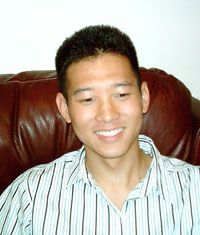Dustin Shiozaki

|
"I've studied numerous
technical methods for the piano, and this one is very good because it harnesses the inner ear to guide the physical execution." |
 | |
|
|
|

|
|
 |

|
 |
Some USSCM Students and Alumni
Location: Utah, U.S.
Major: Performance Principle instrument: Piano Background: Conservatory piano training Goal: making virtuosic arrangements with digital instruments and piano, and performing it live Q I understand that your training before coming to the school was classical. I’d like to know more about that. Does it give you a strong background? A It gave me an attitude to approach music with an attitude of surrender, rather than acquisition. And a pretty good physical technique. Q What brought you to this school? A I was enrolled in a careers class at the University of Utah, and one of our assignments was to interview a music professional. I chose a freelance composer in Utah who wrote contemporary music for the ballet company, and film. He also did live gigs, improvised on the keyboard with Pro Tools. I really liked his sound, and incidently we both studied with the same professor, at different times in our lives. That made a lasting impression, because I could relate to his background, and he had the same type of gig that I could see myself enjoying. I was intrigued about what enables pop artists to reach such wide audiences. People always say it's just luck, but there's always a scientific reason. USSCM seemed the most direct way for me to discover if a tested, and effective methodology exists to train commercial musicians. Q What is it like making the transition from classical to popular music? A It's like learning to speak a new language! Q What do you hope to learn? A How to improvise by ear, and play popular music by ear, arranging, and electronic scoring. Q What reservations did you have about enrolling with the school? A That the curriculum would be rigorous enough. Q How would you describe the school’s program? A It's pretty rigorous! Actually, it's very elegant and well balanced. The theory is in sync with the improvisation studies, which directs the mind into the harmony of the practice. I've studied numerous technical methods for the piano, and this one is very good because it harnesses the inner ear to guide the physical execution. Q Is the program what you expected? A No, I the level of support has exceeded expectations. Q How is the school affecting your playing? A It has improved my technique, improvisation, arranging, and composition skills. Q Is there anything else you have to say that other potential students might find interesting or helpful? A Forget about whatever success or failure you've had in the past, and take little steps to build a solid foundation in this curriculum. Take it with a childish acceptance.
|
|||